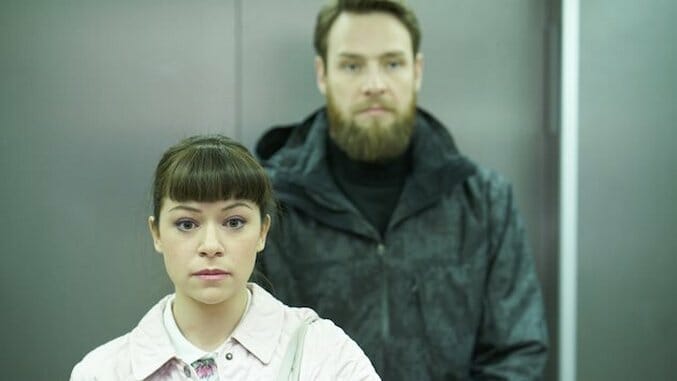Orphan Black Revisits Its Most Beautiful Relationship: Alison and Donnie
(Episode 5.03)
Photo: Ken Woroner/BBC AMERICA
Something beautiful about Orphan Black’s matriarchy is how seriously it takes the Hendrix family’s suburban drama. In fact, in the “previously on…” montage that precedes “Beneath Her Heart,” as much screen time is given to Alison (Tatiana Maslany) and Donnie’s (Kristian Bruun) benign community activities as is their more illicit ones, like dealing drugs (which made absolutely no sense at the time, let’s admit that now) and manslaughter. Or, you know, whatever the legal definition is for idly watching your rival/neighbor be scarf-strangled via garbage disposal. Probably something that starts with the word “negligent.”
The point is, Orphan Black values their normality. They had the uncool life that all the clones now would (and possible will) kill for. When it’s revealed that Alison met Cosima (Maslany) for the first time while on a mushroom trip (complete with sitar music and the tired gags accompanying it), it’s another justification for why the show’s most delightful suburbanites don’t belong in this weird world, but have adapted more than anyone. Time-jumping between first contact and the present, in which the setras mourn their fallen, gives us proper context for Alison’s addictive crisis when it rears its seductively colored capsule.
Alison continues to be my favorite of Maslany’s performances in the show, stuffing the most stringent and emotionally complex of the clones into a tightly wound master manipulator. The series seems to imply that all suburban mothers are like this, and if my mom’s group of hooligans down at the Applebee’s is any indicator, the series is right. Alison balances her troubled faith with the vengeful self-preservation that’s seen her through events that’ve killed far more qualified individuals. Plus, she’s funny as hell when she’s not searching for an escape by chemical means.
This episode is a Hendrix-centric one, focusing on their marital and personal issues a Neolution-riddled police force searches their home in the hope that it will pressure Donnie into revealing where Helena is so they (the Neolutionists) can get her superhuman Wolverine babies. Meanwhile, Donnie is trying to go do a dance in a kilt. Got all that?
-

-

-

-

-

-

-

-

-

-

-

-

-

-

-

-

-

-

-

-

-

-

-

-

-

-

-

-

-

-

-

-

-

-

-

-

-

-

-

-








































